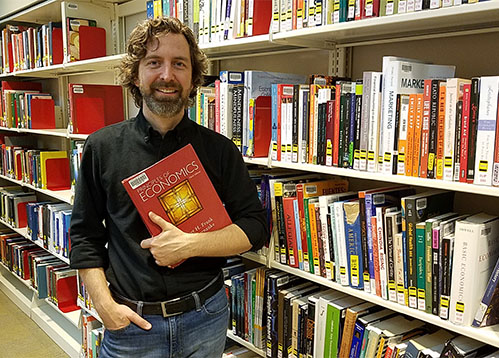Wondering what to do with textbooks as the semester draws to a close? Consider donating them to help other students.
Emory’s First-generation Low Income Partnership (FLIP) developed the

Course reserves coordinator Colin Bragg manages the FLIP textbook collection, which is now housed in the Woodruff Library and includes about 450 textbooks and other class texts. Credit: Emory Libraries.
FLIP Lending Library in 2016. The collection depends on textbooks donated by other students who have finished classes at the end of the current semester. This semester, donation boxes will be placed at the following locations:
- Office of Racial and Cultural Engagement (RACE)
- Center for Women
- Office of Student Success, Programs, and Services
- Office of LGBT Life
FLIP participants – students who have a demonstrated financial need – are able to check textbooks out from the collection for the entire semester. The potential impact on students is staggering – with enough support, the FLIP Lending Library could save students thousands of dollars by giving them access to required texts. First-generation and low income students have already overcome a great deal to get to Emory, and the FLIP Lending Library seeks to remove the burden of extra expenses.
Emory Libraries reserves coordinator Colin Bragg says FLIP previously maintained its lending library at the DUC, which has since been leveled to make way for a new Campus Life Center. Woodruff Library Access Services team leader Amy Boucher mediated the partnership this past spring semester, and along with past FLIP co-president Min Young Park (17C) and Bragg set up the parameters of the program.
Last summer, Bragg and reserves assistant Joelle Danz worked to bring FLIP’s books from the DUC to the Music & Media Library, which now houses them as part of Woodruff Library’s reserves collection. There are about 450 books in the FLIP library, including some novels and other non-textbooks, and FLIP hopes to expand the collection with increased donations. These books are available only to FLIP participants.
“To me, this resource means giving the first-gen, low-income community more educational equality,” Danz says. According to Danz, buying expensive books simply isn’t an option for every student. “This collection allows those students to have the same access to the textbooks as their peers in the class, without creating a significant financial hardship,” she says.
To find out more about the FLIP Lending Library or other ways to get involved with FLIP, send an email to emoryflip [at] gmail [dot] com or visit the group’s Facebook page.
For media inquiries, contact:
- Holly Crenshaw
- Phone: 404-727-0211
- Email: holly.crenshaw@ emory.edu
- Elaine Justice
- Phone: 404-727-0643
- Email: elaine [dot] justice [at] emory [dot] edu
